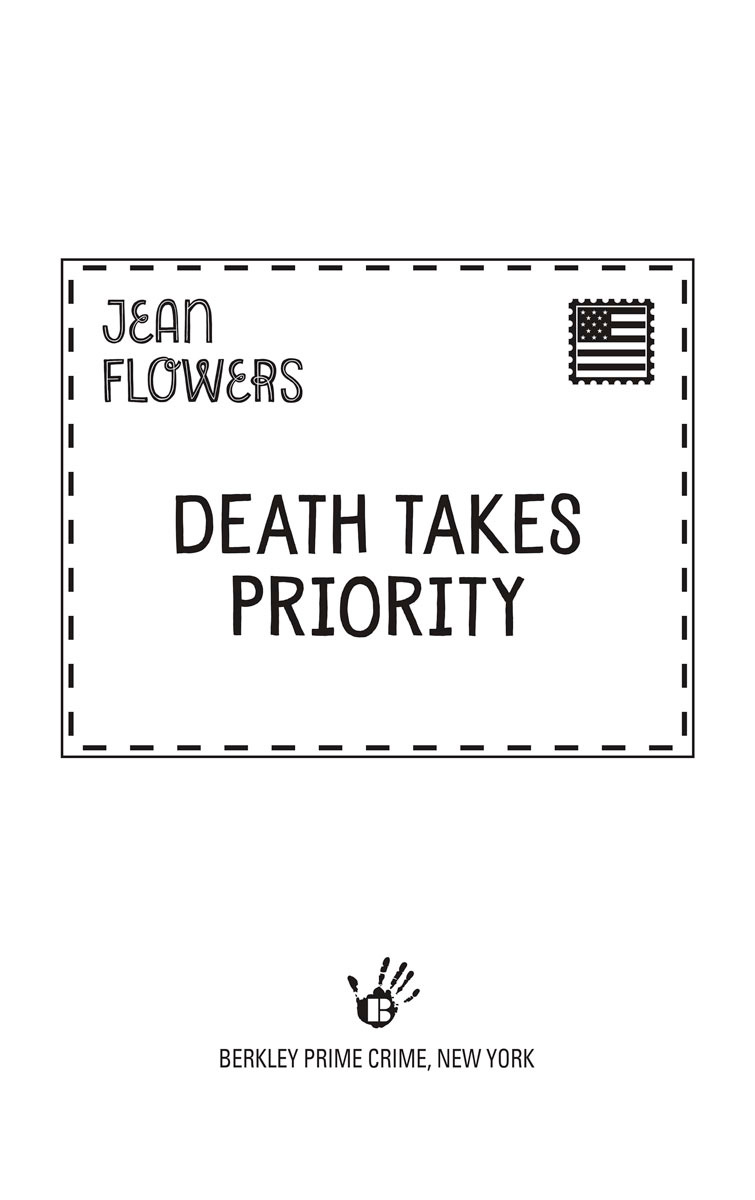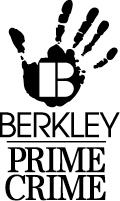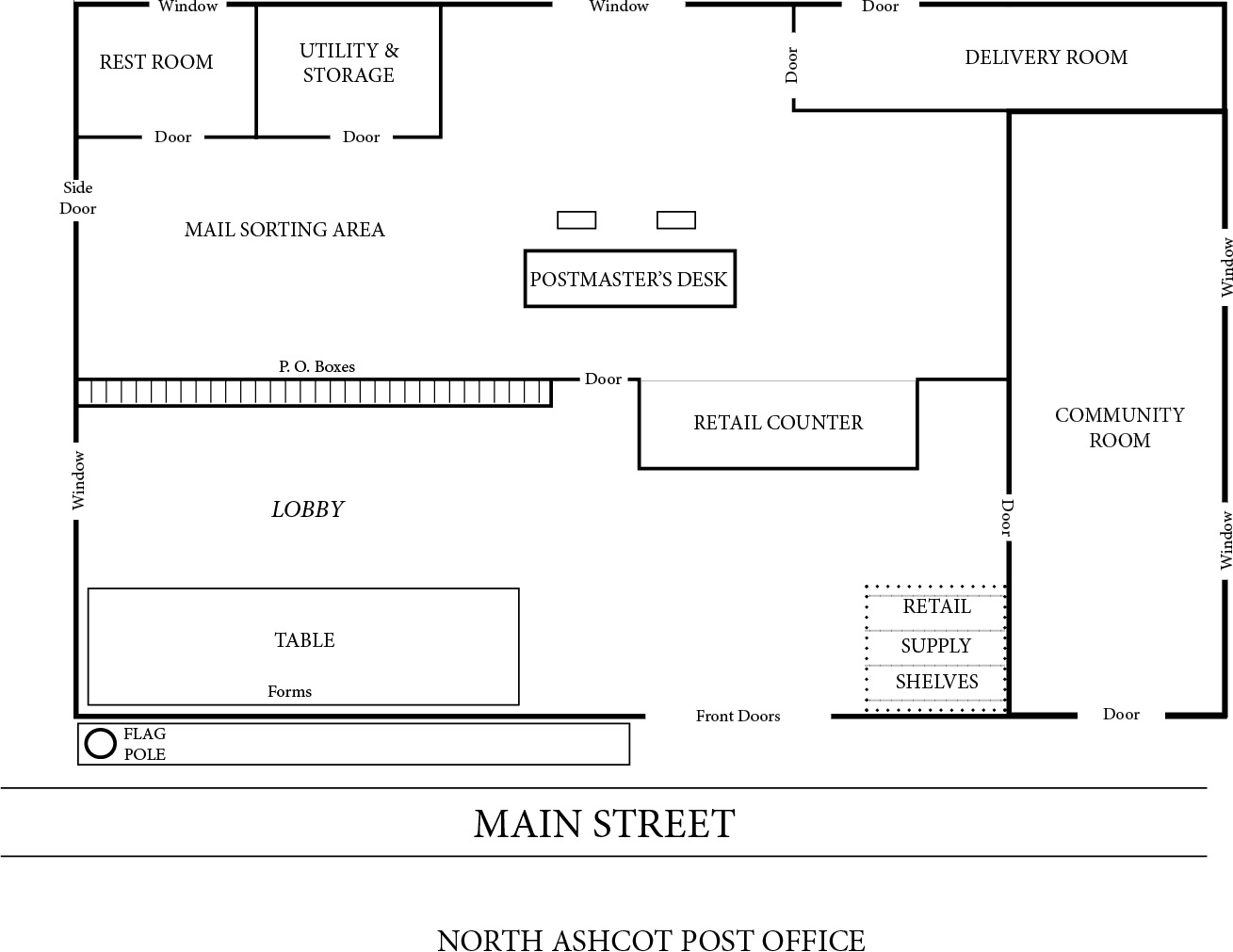Death Takes Priority
Read Death Takes Priority Online
Authors: Jean Flowers


THE LETTER OF THE LAW . . .
I expressed my thanks for the lunch on the way to the front door. Where we met an unusual sight. Sunni Smargon, chief of our five-person police force, in her muted blue-gray uniform, stood leaning against her patrol car, its blue and red lights winking in the cool air. Sunni's arms were folded across her chest, a serious expression on her face. Before we reached the bottom step, Ross Little, one of Sunni's officers, exited the car, and he and Sunni came forward, in step, each with a hand resting on a holster. I could have sworn I heard dramatic music from an old Western in the background.
“Scott James.” Sunni, a small woman with red highlights in hair that was barely contained under her hat, announced his name with an air of authority and a touch of threat. “We need you to come to the station and answer some questions.”
“What's this about?” Scott asked. His voice was soft and shaky, with no conviction, as if he knew the answer . . .


An imprint of Penguin Random House LLC
375 Hudson Street, New York, New York 10014
DEATH TAKES PRIORITY
A Berkley Prime Crime Book / published by arrangement with the author
Copyright © 2015 by Camille Minichino.
Penguin supports copyright. Copyright fuels creativity, encourages diverse voices, promotes free speech, and creates a vibrant culture. Thank you for buying an authorized edition of this book and for complying with copyright laws by not reproducing, scanning, or distributing any part of it in any form without permission. You are supporting writers and allowing Penguin to continue to publish books for every reader.
BERKLEY® PRIME CRIME and the PRIME CRIME design are trademarks of Penguin Random House LLC.
For more information, visit
penguin.com
.
eBook ISBN: 978-0-698-18517-3
PUBLISHING HISTORY
Berkley Prime Crime mass-market edition / November 2015
Cover illustration by Teresa Fasolino.
Cover design by George Long.
Interior map by Richard P. Rufer.
This is a work of fiction. Names, characters, places, and incidents either are the product of the author's imagination or are used fictitiously, and any resemblance to actual persons, living or dead, business establishments, events, or locales is entirely coincidental.

Version_1
Thanks as always to my critique partners: Nannette Rundle Carroll, Margaret Hamilton, Jonnie Jacobs, Rita Lakin, Margaret Lucke, and Sue Stephenson. They are ideally knowledgeable, thorough, and supportive.
Special thanks to Linda Plyler, retired postmaster with a thirty-year career in the postal service, for her generous assistance. I received the full benefit of her professional experience as a training and development specialist in a large city and a postmaster in a one-woman office in a small town. Linda is also an award-winning quilter, whose “zip code quilt” received national recognition and media coverage.
Thanks also to the extraordinary inspector Chris Lux for continued advice on police procedure, and to the many other writers and friends who offered critique, information, brainstorming, and inspiration; in particular: Gail and David Abbate, Sara Bly, James Boudinot, Mary Donovan, Karin Hart, Mary McConnell, Don Nimura, Diana Orgain, Ann Parker, Jean Stokowski, Karen and Mark Streich, Daniel Uemura, and Ellyn Wheeler.
My deepest gratitude goes to my husband, Dick Rufer. I can't imagine working without his support. He's my dedicated Webmaster (minichino.com), layout specialist, and on-call IT department.
Thanks to the copyeditor, the artists, Bethany Blair, and the whole staff at Berkley Prime Crime for all their work on my behalf.
If it seems like a whole village wrote this book, it's because it's true.
Finally, my gratitude to my primary care editor, Michelle Vega, who put it all together. Michelle is a bright light in my life, personally supportive as well as superb at seeing the whole picture without missing the tiniest detail. Thanks, Michelle!

O
n most days, I love my job. Who else gets to start the day by raising the American flag outside her office? Military personnel, I suppose, and maybe law enforcement officers. But they have to suit up with a belt full of tools and weapons, while I just shrug into a comfortable blue shirt and a striped scarf with its special, ready-made, sewn-in knot that sits low and soft on my neck. Not exactly clubbing clothes, but then there aren't any clubs in North Ashcot, Massachusetts, and, anyway, it's Monday and I'm here to work.
“Postmaster Cassie Miller reporting for duty,” I mumbled this morning, resisting the temptation to salute the flag. Instead I smiled and waved at a group of seniors trotting along the sidewalk as fast as they could, their version of jogging. Thanks to their easy pace, they didn't have to slow down to exchange cheery “good morning” greetings with me.
I was grateful for their attention. Each day, it seemed, I got a slightly friendlier vibe than the day before. The town's warming up to me, I thought, a glass-half-full moment.
Today I got a tip of the headband and a “Looking good, Miss Miller” from “Call-me-Moses” Crawford, said to be the town's oldest citizen and a “Hey, sweetie” from Harvey Stone, probably the second oldest. Only one frown, from Harvey's wife, in bright pink sweats and matching sneakers. I figured I was slightly ahead of the game.
I crossed the lawn, kicking a few late fall leaves from the path, and reentered my beautiful building through the side door. The old, one-story, redbrick Colonial Revival, trimmed in newly refreshed white and gold paint, looked good for its age. Over one hundred years old. The building was a popular backdrop for tourists' photos, which delighted me, as long as I was not included in the picture.
The mid-November air was crisp and dry, which didn't rule out a rainstorm, or even an early snow, later today. We were past the peak of foliage and thus also past the height of the tourist season in western Massachusetts, but I believed what the locals claimed about New England weatherâexpect anything, anytime. Or, as my dad used to say: “If you don't like it, wait a minute; it'll change.”
I used to be a local, until I graduated from high school and left for college and a career in the postal service. Here I was trying to reclaim my native status, if that was possible. I'd been back in my hometown of North Ashcot only a little more than three months. Many pluses and minuses so far, but I never regretted coming back to help my aunt Tess through her last days. Time would tell whether there was enough to keep me here now that she was gone.
For now, I removed my outer layers of clothing and focused on sorting last night's mail delivery and setting up for retail hours, which would begin in forty-five minutes. Pretty soon the early birds would arrive. The waiting time in the lobby, before I unlocked the glass doors, was as much a coffee klatch as part of an errand run or a business chore for townspeople. Customers stood with their morning drinks and shared their latest news, covering topics from birthday parties to arthritic joints; from home remodels to money struggles; to the state of downtown shopping. No one objected when I began a new customâdonuts from Hole in the Wall, our local bakery, every Friday, courtesy of me, as long as they lasted. Nothing wrong with a little pandering.
I walked past the business side of the post office boxes, the open slots where I'd stuff each customer's mail; past the worktables and chairs, the nested piles of white plastic tubs, and the various generations of machines, some depending on electricity, others manual contraptions from long ago, but operational in a power outage.
As I reached my desk, behind the retail counter, I had the sense that something was offâthe corner by the delivery room, where the truckers dropped the mail, looked cleaner than usual. Strange. Had a housekeeping fairy stopped by with a mop and broom? I chalked the feeling up to my Monday morning re-entry sluggishness. Not that my weekends were that exciting. I assured myself they'd pick up as I made new friends. Another moment of positive thinking.
I prepared the cash drawer and straightened a framed thank-you note from Mrs. Baldwin and her second-grade class, who'd come for a tour of my building last week. It had
been a struggle to get my mentor, outgoing-PM Ben Gentry, to agree to the children's visit.
Benâformally Benham, after one of the first settlers in Massachusettsâsometimes acted as if he himself had been on the
Mary and John,
the pilgrim ship that landed north of Plymouth Rock in 1630. One of his prized possessions was a limited edition print of the vessel, which to me looked like all the other ships of that era. I wasn't sorry when he packed it up and took it home recently. Given a chance, Ben would remind his customers that he was also the namesake of Benjamin Franklin, the country's first postmaster general. Ben had at his fingertips more facts than you'd ever want to know about the U.S. Postal Service.
When I'd proposed the field trip for the schoolchildren, he'd grimaced, pulled himself to his full height, near six feet, and said, “This is a government office.”
“Not anymore,” I'd replied, as if Ben needed reminding that the postal service had been an independent agency of the government, run by its own board of governors, for more than forty years.
“A technicality,” he'd answered. “It's still not a playground. Not yet.”
The energy of fifteen seven-year-olds eventually overwhelmed Ben, however, in a good way, and at the end of the day I could have sworn I heard him say, “Maybe we should do this again next year.” Curmudgeon or not, Ben had come to my aid more than a few times since my arrival and I was glad he was only semi-retired.
On quiet mornings like this, with things running smoothly, I was happy with my decision to give North
Ashcot another try at feeling like home. Other mornings, I wondered how I got here. Had I been too quick to bail when Adam Robinson, my fiancé back in Boston, walked out on me? Was it as dumb as some claimed that I'd quit my job at the main post office in Boston for this sleepy town in the Berkshires where I was born?
Things seemed to have happened too fast. The news of Aunt Tess's terminal illness, coming on the heels of Adam's departure, had sent me running from my big-city apartment to Aunt Tess's bedside. She'd taken me in after my parents' death during my junior year in high school, and I had to be here for her.
I was lucky that my years of experience at so many levels of postal work in a major zip code, and my professional connections, coincided with Ben's wish to ease into retirement. I'd taken this job on a temporary basis, but now Aunt Tess had been gone a month and here I was. Her home had become mine, legally at least, and I was sole proprietor of my hometown post office. A smart move? A hasty decision?
Useless musings.
I turned from the counter and walked toward the delivery room. For a moment I expected to trip, as I'd done last Friday, becauseâI looked at the floorâthere had been piles of telephone directories in the way. There had been one for each of the more than two hundred households that had a post office box, stacked in the corner where the interior wall of the delivery room met the wall of the adjoining community room. I'd shoved them there on Friday morning, some still in the cartons, some wrapped in slippery green plastic, others separated from the pack, ready for handing
out to customers. Now they were gone. The polished wood floors were clear, not a trace of the phone books. No wonder I'd suspected a housekeeping fairy.
The post office interior was simple, no nooks or crannies that might be hiding such a large amount of paper. Where were the books?
The truckers who dropped off our mail had a key that fit only the lock on the outside door to the delivery room. No one except Ben and me had a key to the postal area itself. The North Ashcot PO had no carriers, no records keeper, no mail handler in the back room, and no window clerk other than yours truly and Ben when he was needed. My one luxury was a part-time cleaning service, in the person of the widow Brenda, who claimed to enjoy working a few hours every two weeks. She had no key and worked only while I was present.
I'd left the side door unlocked as usual this morning while I hoisted the flag, but that was only for a few minutes. No one would have had time to remove all those books. A fleeting thought was that Ben might have figured out another way to distribute them. But he was very careful to respect my position and wouldn't have done that without telling me.
I was faced with the possibility of a theft, though I couldn't think of a single reason why anyone would steal a load of phone books. Who even used them anymore? News streams and blogs predicted the imminent death of the paper directory, but the phone company still paid us to distribute them to our customers free of charge. I guessed that anyone mid-thirties like me, or younger, used the Internet for phone numbers and addresses, both personal and business.
So, where were the books? I nearly screamed out loud, but took a breath instead. Too much stress. Where was that easy, friendly Monday morning?
Should I report this theft to the inspectors, the law enforcement arm of the postal service? A few days ago, I read about a press conference with our inspectors and at least six other federal agencies, after they'd arrested more than fifty people involved in large-scale heroin trafficking into New England. What kind of attention could I expect for stolen telephone directories, each about one-inch thick and filled with ads for goods and services in North Ashcot, Massachusetts, population three thousand, give or take?
I could alert the local police. I could call Wendell Graham, the local phone company rep.
Uh-uh
. Not him. I'd rather talk to a cop than to an old high-school boyfriend. Or I could wait it out, hoping this was a simple mix-up that would magically resolve itself.
As with any crisis, big or small, I called Linda Daniels, my best friend in Boston. I didn't have a best friend in North Ashcot yet, but dwelling on that thought would take me to more useless musings. Other than a serious polarity in musical taste, from Ricky Skaggs (me) to the Smashing Pumpkins (her), Linda and I were of one mind about most of the usual BFF topics, including books, purses, and office politics. Linda was still climbing the career ladder in the capital city's main post office. If it had been up to her, I'd be on the ladder with her.
I poured out my tale of grand theft phone book to Linda, then added, “I think I should at least inform the police department.”
Linda laughed. “Such as it is. You're not in Boston anymore, sweetie. There's no BPD there with two thousand cops and a special robbery division.”
“What I mean is, I should tell Sunni Smargon.”
“Your friend, the police chief. Why do I always smile when I say that?”
I resisted the temptation to lay into Linda for her condescending attitude. As if Sunni weren't a real, sworn officer of the law, in charge of four other officers and responsible for protecting and serving our three thousand citizens. “What if there's something else missing that I haven't noticed yet? What if this is the start of some kind of crime wave that Sunni should watch out for?”
From two hundred miles away, Linda tried to put things in perspective for me.
“Are you saying you think there's a serial phone book thief loose out in the boonies?” she asked.
“It's not the boonies,” I said, finally ready to defend my old-new home. “It's a tourist attraction, a charming town with one of the lowest crime rates in the state.”
“The rate's gone up,” she said. “I believe a crime was just reported to me?”
“Good point.” One that got us laughing.
I pictured Linda behind her desk in Human Resources at the main plant in Boston, looking out her window at the large fleet of vehicles bearing the post office eagle. We always joked that we were meant to be friends since we were the two tallest women in the building, both five-nine and relatively fit, but easily distinguished by our hairstylesâhers short, blond, and neat; mine long, dark, and too curly to ever be neat.
For all her uppity tone, which I knew stemmed from her desire to have me back, I missed Linda. I hated to admit it, but I missed Adam. I missed ubiquitous great pizza and bad-for-me donuts on every street corner. I missed drivers who thought nothing of passing on the right even if it meant pulling up onto the sidewalk.
“Is that old cheerleader still hassling you?” Linda asked. “Bunny something? Maybe she committed local larceny in retaliation for when you went to the prom with what's-his-name.”
“High school grudges die hard, but I can't see
Bonnie
orchestrating this kind of payback. Besides, I think she went to college in California and never came back. And I don't even remember what's-his-name's name.” I heard Linda clear her throat, waiting. “Oh, okay,” I admitted. “What's-his-name was the once-very-hot big man on campus, Wendell Graham.”
“And where does he work now?” she asked, adding a “Hmm,” in a tone that suggested I should do the math: missing phone books, plus ex-boyfriend who works for the phone company, equals: blame Wendell for the theft of the directories.
I'd forgotten that I'd shared with Linda how strangely Wendell had behaved when he stopped in at my post office a month ago. He'd introduced himself formally as a stranger might, as a field supervisor from the local central office of the telephone company. No “Good to see you after all these years.” No handshake paired with “Let's get together and catch up.” Barely a “Good morning, Cassie,” and he was down to business. This certainly was not the personality that got him a large retinue of buddies in his adolescence.
I'd tried to remember if there'd been even a whiff of animosity in our last meeting before I left town those many years ago. Had I broken a date with him? Forgotten his old Mustang's birthday? Had too long a conversation with another guy? My memory failed to call up anything antagonistic. Or anything we'd said, in fact. On the other hand, I wished I could suppress as well the image of that horrid green prom dress I'd worn, with the asymmetric balloon hem. And the matching shoes, which were flats because I was two inches taller than Wendell.